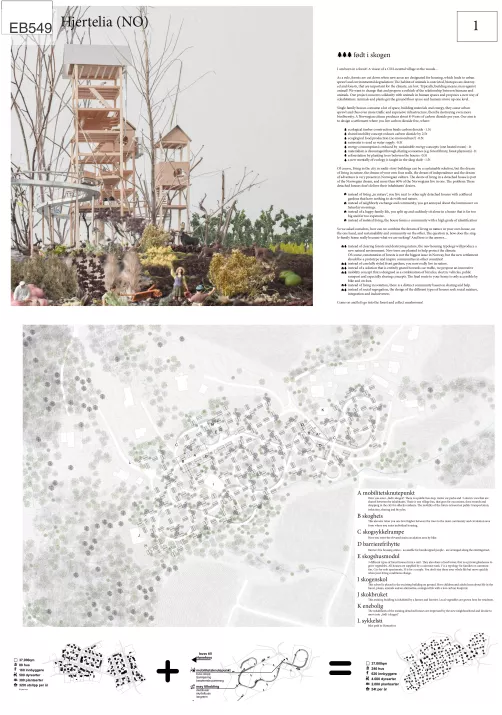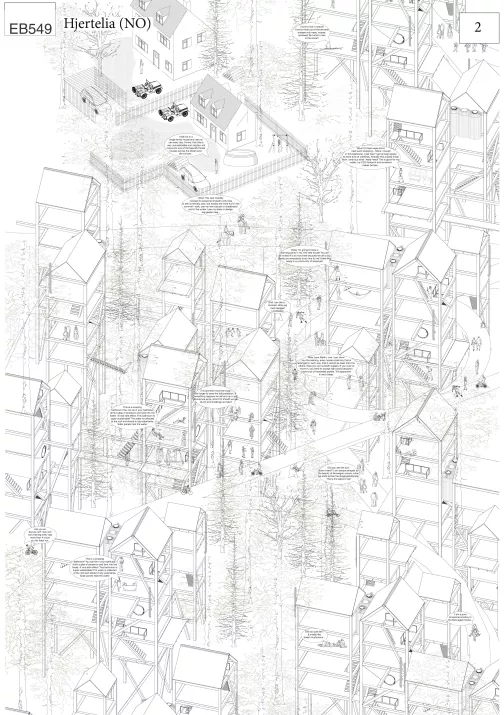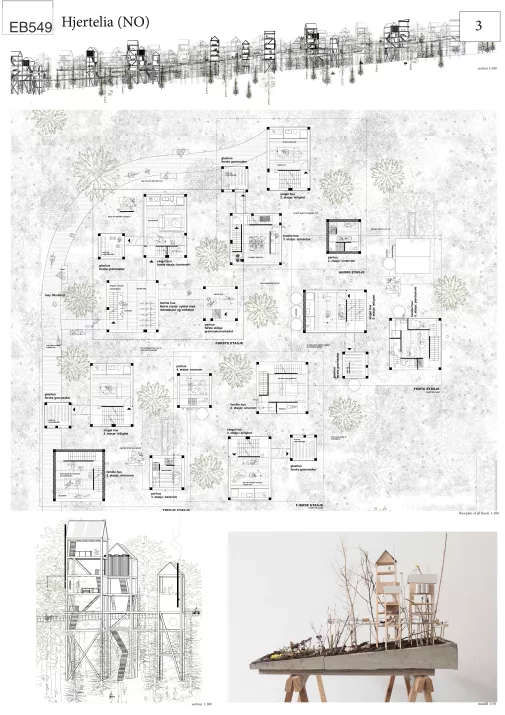Project:
Født i skogen
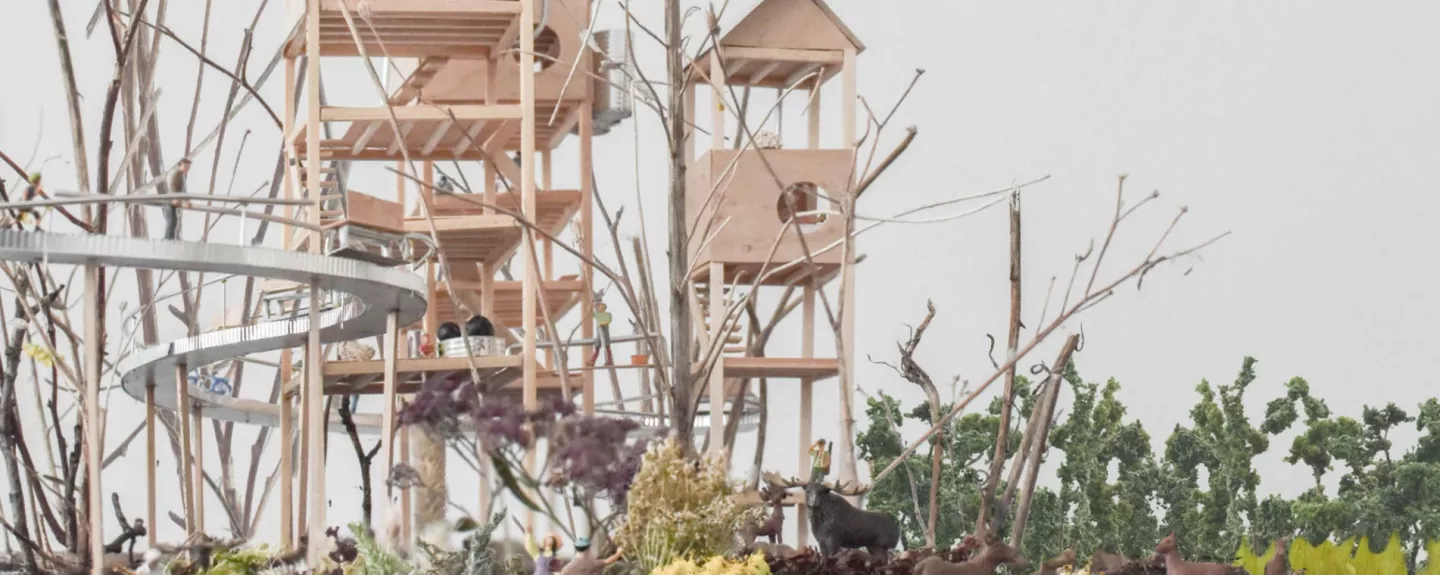
About
-
I am born in a forest! As a rule, forests are cut down when new areas are designated for housing, which leads to urban sprawl and environmental degradation: The habitat of animals is restricted, biotopes are destroyed and forests, that are important for the climate, are lost. Typically, building means: man against animal! We want to change that and propose a rethink of the relationship between humans and animals. Our project concerns solidarity with animals in human spaces and proposes a new way of cohabitation: Animals and plants get the ground floor space and humans move up one level. So we designed a new typology which combine the dream of living in the nature with sustainability. Come on and let’s go into the forest and collect mushrooms!
-
The jury commends the project for a strong and beautifully represented proposal to live among trees while animals and plants are getting the “ground floor”. Depicted like a dream or a psychogram, it picks up on the ideal of Scandinavian living, the concept of dwelling outside, of cottage areas and extrapolates these into a radical idea of settlement woven into non-human elements such as trees very much in line with the theme of Europan 16 “Living Cities - Metabolic Vitalities & Inclusive Vitalities".
However, there are some flaws regarding the notion of site, and practical concerns. First, the proposal is founded on the assumption of there being or growing a forest on the site, while the actual landscape is characterized by farmland and ravines. Second, the ultra slim building volumes and missing envelopes question the project’s feasibility in terms of resource use and energy consumption. Plans and sections do not take into account universal design, and therefore counteract Europan 16’s claim of inclusion. -
Associates: Benedikt Hartl (DE) – architect, Thomas Haseneder (DE) – architect urbanist
Opposite Office
Schäftlarnstr. 10, 81371 Munich, Germany
www.oppositeoffice.com
Team interview
1. How did you form the team for the competition?
We are a small office in Munich. Benedikt is the founder of Opposite Office. Thomas Haseneder, a qualified urbanist, is working for Opposite Office since 2018.
2. How do you define the main issue of your project, and how did you answer on this session main topic, Living cities?
Looking back in history we can ask ourselves if the technical progress, workmanship, alienation of nature, have only good things for our living! Compared to neanderthal and the early humankind we have a very boring life in boring offices and boring houses. We need more adventure in our live! That will be a real living city.
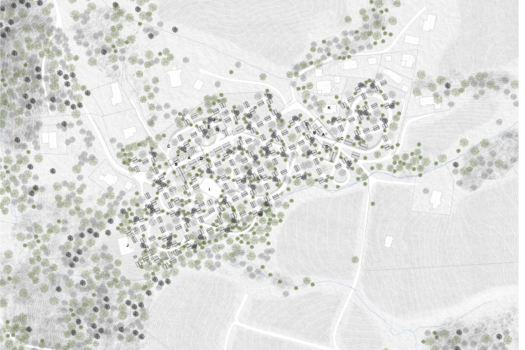
3. How did the issues on metabolic and inclusive vitalities and the questions raised by the site mutation meet?
We feel more like monkeys…
4. Have you treated this issue previously? What were the reference projects that inspired yours?
Monkey homes.
5. Urban-architectural projects like the ones in Europan can only be implemented together with the actors through a negotiated process and in time. How did you consider this issue in your project?
Unfortunately, we didn’t win, so we are not in the position of negotiation. Otherwise we would be very good negotiators.
6. Is it the first time you have been awarded a prize at Europan? How could this help you in your professional career?
Yes. I don’t think that a Special Mention will help. If you can cheat something, it might help us.
TEAM IDENTITY
Office: Opposite Office
Function: architecture, urbanism
Average age of the associates: 30 years old
Has your team, together or separately, already conceived or implemented some projects and/or won any competition? if yes, which ones?
- 1. Prize, workshop for disabled people in Rosenheim, Germany, together with studio lot
- 1. Prize, Social Design Award, DER SPIEGEL, Germany 2019
- 2. Prize XS – experimental holiday houses, IBA Thüringen, 2018
- Nomination for „Förderpreis der Landeshauptstadt München“, Germany 2022
- Berlin Design Award Silver, Driven x Design, Germany 2021
- Winner Open Call Crossroads - Building the Resilient City, SBAU, South Korea 2021
- Special Mention, Call for Ideas Liebling Haus Tel Aviv, Israel 2021
- Winner Open Call All the Beauties of the Cities, FAP 2020
- Winner Open Call What do we have in common?, TAB, Georgia 2020
- Finalist, One Drawing Challenge, Architzer, Brooklyn, New York, USA 2020
- Auszeichung IBA Kandidat, Thüringen, Germany 2019
- Honorable Mention, Affordable Housing London, UK 2019
- 1. Preis Essaycompetition Archive, UK 2019
- Honorable Mention, OCEAN seamuseum, Portugal 2018
- Honorable Mention, Art Prison Ideenwettbewerb, Sicily, Italy 2018
- nomination, SARP Award, Germany 2012
- Special Mention, Zurück in die Stadt - Bauen in der Lücke, Baumeister, Germany 2011
Does your team share a common workplace? if yes, give us a short description:
Our studio is based in Munich in the area of the central market in a old « Kontorhaus ». When we start to work, most of the works are already calling it a day. In evening and night you can easily find our office, since it is the only window with lights in it.
Related projects
-

Building the ecotone
In Hjertelia, we want to develop a new form of neighborhood where agriculture, manufacturing…
-

Self nurturing city
The Self-Nurturing City proposal will rely on renewable energy, and renewable and recycled…
-

Født i skogen
We want to change that and propose a rethink of the relationship between humans and animals. Our…
